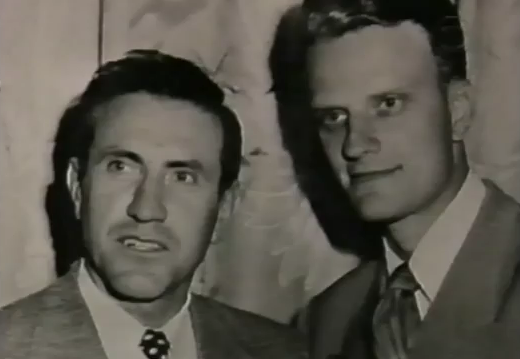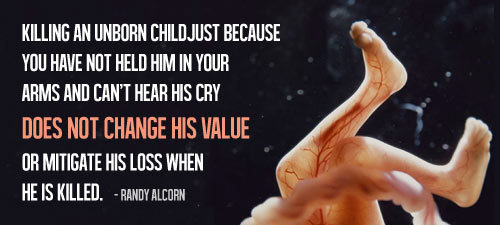Randy Alcorn's Blog, page 170
January 21, 2015
Is Reading the Bible Worth It?

In this video, EPM’s Julia Stager addresses the costs and benefits of making a habit out of reading the Bible. Julia also provides some great tips on getting into the Word that I hope will encourage you to set and keep a daily appointment with God. We all need to withdraw from life’s busyness to seek Him in solitude.
It is worth any “sacrifice” to spend time in God’s presence. No time spent with Christ is wasted time.
If you’d like to watch the rest of Julia’s videos, you can subscribe to her YouTube channel: Crossover.

Each blog regularly appears on my Facebook page. If you’d like to comment or see others’ comments, we invite you to join us there.
January 19, 2015
Developing Godly Qualities in Our Children

What qualities does God want us to develop in our children? No need to guess. Scripture tells us specifically: “And what does the LORD require of you? To act justly and to have mercy and to walk humbly with your God” (Micah 6:9). These three requirements are a basis for evaluating our children’s character development:
1. Are my children learning to act justly? That is, to deal honestly and fairly with others, and to respect, care for and intervene on behalf of the weak, vulnerable and oppressed? (Or are they compromising in matters of morals and integrity, and passively accepting society’s mistreatment of those for whom God says we should speak up?)
2. Are my children learning to be merciful? That is, to discern with sensitivity the personal and spiritual needs of others in family, school, community, society and world, and reach out to them in love and compassion? (Or are they part of a clique that snubs the non-cool, or so absorbed in their own activities, interests and possessions that they don’t see or care about the hurting people around them?)
3. Are my children learning to walk humbly with their God? That is, to know Him personally, to have a consistent daily time devoted only to Him, and to exercise a humility that recognizes His lordship and their servanthood for Him and others? (Or are they too busy to spend time with God, and too self-proud and self-sufficient to realize they desperately need God’s help to do all that is worth doing?)
Teaching our children the truth is absolutely necessary, but it is not sufficient. The solid foundation for a life is not just hearing the words of God, but doing them (Matthew 7:24-27). By our own example as their parents, we must teach our children God’s truth, demonstrating it in application and obedience. The truth that time must be spent with God must be demonstrated by the time we spend with God. The truth about Christ’s forgiveness must be shown as we seek and grant forgiveness in our home. The truth that evangelism is important must be demonstrated by our efforts in evangelism. As parents, we must model our stated convictions with courage and devotion. Otherwise what we do will speak so loudly they won’t hear a word we’re saying. Sometimes our children will fail to listen to us. Seldom will they fail to imitate us.
If parents teach children truth with their mouths, without setting the example of righteousness, devotion, wisdom and courage, then children will learn to scorn, disregard or abuse the truth. They will end up as rebels (rejecting the truth), nominal Christians (superficially recognizing the truth, but living like the world) or legalists (treating the truth as a sterile set of rules by which to pass judgment on others).
Wisdom is the ability to skillfully apply truth to the situations of daily life. There is one book of Scripture written for a child by his parent, specifically designed to help him make wise and character-building decisions. That book is Proverbs. The study, discussion and application of Proverbs should be a central part of training our children. It is filled with hundreds of practical moral guidelines for living life. It teaches not only what is right and wrong, but shows that what is right is also smart, and what is wrong is also stupid. This provides a double motivation for our children—and their parents—to live righteously.
At the dinner table, read a verse or passage in Proverbs focusing on a central truth. Then ask your children to try to put it in their own words, and come up with a specific application or illustration of it. Discover what it means as a family. Then ask each person to actually apply this truth within the next twenty-four hours and report back to the family what he or she did. Their discernment and skill in application will dramatically develop with practice—as will their love for the truth they are living, and the Lord they are serving.
Run the race. Don’t drop the baton. Pass it on with care and enthusiasm to your children and grandchildren. So that at the end of the course, at the beginning of the wonderful new life in the presence of God, we—and they—will hear Him say, “Well done, my good and faithful servants.”
“Love the LORD your God with all your heart and with all your soul and with all your strength. These commandments that I give you today are to be upon your hearts. Impress them on your children. Talk about them when you sit at home and when you walk along the road, when you lie down and when your get up.” (Deuteronomy 6:5-7)

Each blog regularly appears on my Facebook page. If you’d like to comment or see others’ comments, we invite you to join us there.
January 16, 2015
A Discussion with Lecrae and John Piper on Hip Hop, Abortion, and Race

John Ensor, president of Passion Life Ministries, recently sat down with Christian Hip Hop artist Lecrae and John Piper to discuss abortion and racism, as we mark Sanctity of Human Life Sunday (January 18) and Martin Luther King, Jr. Day (January 19).
This is a compelling discussion about the story behind Lecrae’s song “Good, Bad, Ugly,” the remorse of abortion, and ultimately the healing power of the gospel of Christ. I love and have great respect for both Lecrae and Piper, and appreciate so much what they have to share. Listen to Lecrae’s story about his bad decisions and, more significantly, the powerful grace of God in his life. Some great dialogue on Hip Hop and Rap as well.
I encourage you to watch and share the video with others:
Also, If you want to hear the passion and see on the screen words with great biblical and theological substance, sometime check out Lecrae’s “Don’t Waste Your Life."

Each blog regularly appears on my Facebook page. If you’d like to comment or see others’ comments, we invite you to join us there.
January 14, 2015
From Brokenness and Hate to Redemption and Forgiveness: Louis Zamperini’s Whole Story
 One of the most compelling stories told in the past decades, in the book and movie Unbroken, is that of Louis Zamperini, Olympic athlete and airman who survived for 47 days on the open ocean, and 26 months, much of it enduring torture, in Japanese POW camps. I listened to the audio book Unbroken, the story of Louie Zamperini, written Laura Hildebrand. It was a powerful and remarkable book, as all who’ve read it know.
One of the most compelling stories told in the past decades, in the book and movie Unbroken, is that of Louis Zamperini, Olympic athlete and airman who survived for 47 days on the open ocean, and 26 months, much of it enduring torture, in Japanese POW camps. I listened to the audio book Unbroken, the story of Louie Zamperini, written Laura Hildebrand. It was a powerful and remarkable book, as all who’ve read it know.
The movie is well done as a portrayal of the human spirit’s will to survive, but it leaves untold (despite the few pictures and words after the movie ends) the true redemptive story that followed Zamperini’s return from captivity. Known as a hero for his incredible survival skills, he was deeply scarred, full of hatred, and plagued by nightmares of “The Bird,” his chief torturer in the camp. The war hero became a carousing alcoholic, abusive to his wife, and neglectful of his young daughter.
In contrast to the “triumph of the human spirit” message, Zamperini did not have in himself what it took to become a whole person, to put his horrific ordeals behind him, and survive in normal life. The key to everything was that he did not know what it meant to be forgiven for his own sins, and therefore could not begin to forgive the Japanese prison guards for the horrific abuses they inflicted on him. While freed from the Japanese prison, he remained imprisoned in his inner man and was as miserable, even more so, in his so-called freedom as he’d been in captivity.
 Ironically, in stark contrast to the title Unbroken—which aptly describes part one of the story (the part dramatized in the movie)—to find redemption Louie Zamperini had to become broken. That’s when he came to terms with his sin and found forgiveness in Jesus Christ. Once that happened he said he became free, and never again had his haunting dreams.
Ironically, in stark contrast to the title Unbroken—which aptly describes part one of the story (the part dramatized in the movie)—to find redemption Louie Zamperini had to become broken. That’s when he came to terms with his sin and found forgiveness in Jesus Christ. Once that happened he said he became free, and never again had his haunting dreams.
Four years after his conversion, Zamperini returned to Japan and visited Sugamo Prison, where most of his torturers were incarcerated. Looking at the crowd of prisoners, he recognized these men. He ran to them and threw his arms around them, expressed his forgiveness, and shared with them the good news of Jesus.
Zamperini said, “The most important thing in my Christian life was to know that I forgave them—not only verbally, but to see them face to face. That's part of conversion.”
Sadly, most of the guards withdrew from him because they couldn’t comprehend his forgiveness. But when he preached the gospel to them, all but one made a profession of faith in Jesus that day.
Matsuhiro Watanabe, “The Bird,” who had tortured him most brutally, wasn’t there—despite being on the most wanted list of Japanese War Criminals, he’d escaped prosecution.
When Watanabe was later found, by then a rich businessman, he refused to meet with Zamperini. Louis sent a letter explaining that he’d given his life to Christ. “Love replaced the hate I had for you,” he wrote, adding “I hope you become a Christian.” (Zamperini is on video reading the letter.)
 Having experienced God’s grace and forgiveness, and having extended it to those who tortured him, Louis was declared by a pastor who worked with him in his seventies, “The happiest man I’ve ever known.”
Having experienced God’s grace and forgiveness, and having extended it to those who tortured him, Louis was declared by a pastor who worked with him in his seventies, “The happiest man I’ve ever known.”
As compelling as the first part of Louis Zamperini’s story is, it’s the second part that’s the greatest miracle, and truly redemptive. The first part, standing on its own, is a testimony to God’s remarkable common grace in a human life; the second is a testimony to His special grace in transforming a still-captive man with the freedom of forgiveness. Only through Christ is such redemption and healing possible.
Survival and redemption are not the same—though in the end it was Zamperini’s redemption that allowed him to survive. And it’s only Christ’s redemptive work on our behalf, atoning for our sins, that will allow any person to survive the final judgment of God and experience the result of redemption: eternal life.
Other blogs about Zamperini, and the book and movie Unbroken:
This column by Cal Thomas asks the question of why a very critical part of Louie Zamperini's story is left out of the movie.
In her article, Amber Clayson summarizes Louie’s conversion.
Ivan Mesa, with the Gospel Coalition, writes about the power of conversion in Louie’s life.
I also encourage you to watch “Captured by Grace,” the rest of Louie’s story as produced by the Billy Graham Evangelistic Association.

Each blog regularly appears on my Facebook page. If you’d like to comment or see others’ comments, we invite you to join us there.
January 12, 2015
Should We Leave Our Children Inheritances?
 Scripture says that “A good man leaves an inheritance for his children’s children” (Proverbs 13:22). As a result, many Christians defend and justify leaving vast sums of wealth to their children and grandchildren. I think in order to understand the principle behind this verse, we need to compare what an inheritance meant in biblical times, versus what an inheritance means in this culture today.
Scripture says that “A good man leaves an inheritance for his children’s children” (Proverbs 13:22). As a result, many Christians defend and justify leaving vast sums of wealth to their children and grandchildren. I think in order to understand the principle behind this verse, we need to compare what an inheritance meant in biblical times, versus what an inheritance means in this culture today.
In Old Testament times, passing on ownership of the land to children and grandchildren was vital. Without it, succeeding generations couldn’t do their farming or raise livestock. Many people lived at a subsistence level. Most were too poor to buy land. With no inheritance they could end up enslaved or unable to care for their parents and grandparents, who normally lived on the property with them until they died.
Today in America, however, things are very different. Inheritances are usually windfalls coming to people who live separately from their parents, have their own careers, are financially independent, and already have more than they need. Most often they aren’t carrying on the family business, or if they are, they don’t need a windfall in order to continue doing so. They have dependable sources of income generated by their own work, skills, saving, and investing. When such people inherit a farm, house, or other real estate, what becomes of it? Typically, they liquidate the asset or use it as a further source of income. They do not need the land or the money. Having it will simply mean increasing their standard of living, sometimes dramatically.
Those who cite Scripture to prove that parents should leave an inheritance to children typically do not follow Scripture’s guidelines of leaving to sons only, a double portion to the firstborn, and so on. Hebrew firstborn sons were legally entitled to a double portion of inheritance (Deuteronomy 21:17). If a man died without sons, the inheritance went to his daughters, if no daughters to his brothers, if no brothers to his nearest relatives (Numbers 27:1-11). Ultimately land could not be lost to a family line, as it reverted to them in the year of Jubilee, when all debts were canceled.
It seems inconsistent to say that an inheritance should be left because the Bible says so but then to turn around and do it very differently than the Bible explains. A better approach is to understand the reasons for inheritance, then see these not as rules to be legalistically obeyed but as underlying principles that we should weigh.
In Biblical times, daughters often remained in their father’s home or they lived with their husbands, enjoying the benefits of his land. A father’s inheritance did not normally go to his daughters, most likely so as not to interfere with their husbands’ responsibility to provide for them. As a father of daughters, I consider it important not to leave money that would interfere with my sons-in-law’s responsibility to provide for my daughters. How dare I take away from them the character-building privilege and divine calling of working hard to care for their families? Many well-meaning parents have caused serious marital conflicts by leaving money to their grown children. Money that’s “his” and “hers” divides the marriage and fosters an unhealthy independence. Married couples who inherit wealth should not keep it separate from each other.
In a society with such affluence and opportunity as our own, I believe that in most cases Christian parents should seriously consider leaving the bulk of their estate to churches, parachurch ministries, missions, and other kingdom purposes, leaving only a small portion to their children. Leaving a large inheritance to children is not just a missed opportunity to invest in God’s kingdom. It’s also rarely in the children’s best interests.
I’ve heard countless inheritance horror stories over the years. Study the lives of people who have inherited significant wealth and you’ll find that in the vast majority of cases, it’s made them more unhappy, greedy, and cynical. Who needs to work hard when you’ve got all that money? Money funds new temptations, including addictions. Giving money to a careless spender is throwing gasoline on a fire. And nothing divides siblings more quickly than a large inheritance. Leaving more to God’s kingdom and less to financially independent children is not just an act of love toward God, but toward them.
Andrew Carnegie said, “The almighty dollar bequeathed to a child is an almighty curse. No man has the right to handicap his son with such a burden as great wealth.” Cornelius Vanderbilt said, “Inherited wealth is as certain death to ambition as cocaine is to morality.” Henry Ford stated, “Fortunes tend to self-destruction by destroying those who inherit them.”
More important, God says, “An inheritance quickly gained at the beginning will not be blessed at the end” (Proverbs 20:21, NIV). Wise parents can leave enough to their children and grandchildren to be helpful without leaving them so much as to hurt them.
Of course, besides preventing harm to our children, there is great good we can do by leaving money to God-exalting ministries. Any family members who would pout about or fight over what belonged to their deceased parents or who respond negatively when we decide to leave most of our money to the cause of Christ instead of to them prove they’re unqualified to inherit in the first place. Such children need prayer and guidance. What they certainly do not need is more money.
If parents decide to give most or all of their estate to God’s Kingdom, they should explain their plans to their children. This will prevent false expectations and free their children from later resentment. It will also alleviate present guilt feelings stemming from what children might imagine they have to gain by their parents’ death. Even though they know they shouldn’t, grown children commonly find themselves thinking about and looking forward to all the money and possessions that will be theirs when their parents die. Some go into debt now because they expect to, so to speak, win the lottery through their parents’ deaths. The sooner these attitudes are defused, the better.
I recommend having a family conference or writing out in detail what your plan is, then asking each adult child to get back to you with his or her response. Committed Christians, whose parents declare their intent to leave most of their estate to God’s work, will be the first to say, “That’s wonderful, Dad and Mom. Go for it! And thanks for being a great example to us.”
Nanci and I will leave to our daughters only enough to be of modest assistance, but not enough to change their lifestyles or undercut their need to plan and pray with and depend on their husbands. We’ve communicated this, and they understand and agree with our plan to give most of our estate to God’s kingdom.
Certainly we should not transfer wealth to adult children unless we’ve successfully transferred wisdom to them. Without wisdom, wealth will not only be wasted, but it will damage our children by subsidizing addictions, laziness, and immorality.
Your children should love the Lord, work hard, and experience the joy of trusting God. More important than leaving your children an inheritance is leaving them a spiritual heritage.
Let God decide how much to provide for your adult children. Once they’re on their own, the money you’ve generated under God’s provision doesn’t belong to your children—it belongs to Him. After all, if your money manager died, what would you think if he left all your money to his children?

Each blog regularly appears on my Facebook page. If you’d like to comment or see others’ comments, we invite you to join us there.
photo credit: quinn.anya via photopin cc
January 9, 2015
He Was the Only One to Defend the Disabled

Guest post from Kathy Norquist, Randy’s executive assistant.
My nephew, Tyler, is finishing up his college courses and was taking a biology class to complete some requirements. The topic of testing during pregnancy to see if your baby is healthy came up during class. The question was asked, “Would you abort your child if there was a medical problem?” Tyler was the ONLY one who adamantly said no. He was shocked at the other students’ casual attitude about aborting a baby (they didn't call it a baby) since it would be such a burden to the parents and society. “It couldn't possibly be happy if it was unhealthy or disabled.” “When does it become a human life anyway?”
Of course, Tyler said it's a life at the moment of conception. He went on to ask, “What about the baby's choice?” and “How do you know if the child would be happy or not, and what a joy he/she could be to their family?” They just didn't get it.
At the end he asked, “Why not just wait until the baby is born and then you can decide whether to kill it or not?” They all said, “That would be murder!” He said, “Exactly.”
Here’s a picture of five of Tyler’s seven disabled siblings ready to attend a Phoenix Suns basketball game, all adopted with special needs. Any idea why Tyler responded the way he did? :)

Needless to say, I’m extremely proud of my nephew for standing alone, and for standing up for the unborn, especially the disabled.
Kathy Norquist
Executive Assistant to Randy Alcorn
January 7, 2015
How Did Jesus Save Us?

In part two of her two-part series on the cross and the atonement, EPM’s Julia Stager explores “How does Jesus dying on the cross save us? What are we saved from? What are we saved into?” (See also part one, “Why the Cross?”)
This video is a clear, concise and engaging explanation of the Gospel in less than 3 minutes—don't miss it! You may want to pass it on to others.
If you’re interested in watching the rest of Julia’s videos, you can subscribe to her YouTube channel: Crossover.

Each blog regularly appears on my Facebook page. If you’d like to comment or see others’ comments, we invite you to join us there.
January 5, 2015
Teaching in Jail

Today’s guest blog is from writer Jill Kandel. Nanci and I spent ten days with Jill and her family 26 years ago, when they were in England after having served in humanitarian work in Zambia. Jill has been teaching journal writing to female inmates at a local jail for almost two years. Since prison outreach is close to our hearts, with EPM sending hundreds of my books a month to prisoners, and corresponding with them, I asked Jill to share about her ministry there. I think you’ll appreciate this! —Randy
When I tell people that I teach at a county jail they are often curious. "What's it like?" and "Do you feel safe?" are frequently asked questions. Mostly people want to know if it does any good. "Really? Why bother?" is often the attitude.
My reasons for working in jail are multiple, but they are not complex.
 I teach classes in jail because it's good for my community. Of the 7,800 men and women who come through our jail each year, 97% of them will stay within the county after they are released. People in jail are people. They have lives and connections they return to.
I teach classes in jail because it's good for my community. Of the 7,800 men and women who come through our jail each year, 97% of them will stay within the county after they are released. People in jail are people. They have lives and connections they return to.
Our jail chaplain program coordinates men and women around our city who go into jail to teach GED, Moms-in-Touch, Celebrate Recover, Women's Bible Study, Men's Bible Study, Dad's-in-Touch, Anger Management, Crown Financial Services, Alpha Program, Knitting, Stamping, Art, and Journal Writing classes. Inmates who attend emerge from jail better skilled to live productive lives. The jail chaplain program also provides transitional housing, food and jobs for returning citizens and helps them get on their feet, offering them a church home and stability. This cuts recidivism rates and helps produce citizens who honor God with their life choices.
I teach classes in jail because it is what God has gifted me to do. Years ago, I was asked to write a story about a young mother who'd been a meth addict and served time in county jail. She met the Lord in jail and had been drug free for five years. After the story came out, the jail programs officer asked if I'd be interested in teaching journal writing skills to female inmates. I said no. But God had other plans. Over the course of the next year, God changed my heart. I called the programs officer back and said yes. I've been going to jail once a week to teach journal writing skills to female inmates ever since.
I used to think, "Stamping classes? Knitting classes? Why would they be helpful?" But the men and women who teach the classes are believers and God has called them. Because of the classes the inmates have hand-made scarves to give to their children at Christmas. They have hand-made cards for birthdays and holidays. The conversations that flow around the room during the classes are uplifting and God-honoring. "When I told one man what a great job he'd done knitting his scarf," one teacher said, "He told me it was the first time in his life anyone had ever told him he'd done a good job."
God takes all of His Gifting, whether it is writing, or financial knowledge, or being a great mom, and He uses the gifts He gives.
I teach classes in jail because God has called me to serve. When I first started teaching, I viewed myself as a volunteer, one of the approximate 62.6 million people in America who volunteered through or for an organization each year. Over the years, I've come to a different understanding. God doesn't call us to volunteer. He calls us to serve. Volunteer work is work done for a program, a foundation, or an institution. Servant-hood is a calling and a mandate. Christ came into our hurting broken world. He asks nothing less of us.
Volunteering may be fine for a club, but not for the church. Volunteering is something free people do. Servants, on the other hand, can only humbly and obediently respond to their master's command. "For even the Son of Man did not come to be served, but to serve, and to give his life as a ransom for many." Mark 10:45
I teach classes in jail because it blesses me. Jail is a profoundly moving place to work. God is there. There is little pretense and great need. God meets us in that room filled with women dressed in orange. Working in jail has become one of the great blessings in my life. God not only uses His gifts for His glory and Kingdom, but He uses them for our own joy and growth.
The class I teach has about twenty women each week. This week we read Bible verses concerning the Biblical concept of hope as 'certainty' from Hebrews 11, Jeremiah 29, and Romans 15. We have hope because God is faithful, not because we are. I have heard women say that jail is the best thing that ever happened to them. I have seen women turn their hearts to God. I have seen more miracles in jail than anywhere else on this planet. It is a holy place. It is a place where God is at work and that is an amazing thing to behold.
I teach classes in jail because I want to be found faithful. The bottom line—the one that gives me an eternal perspective in my day to day life—is this: When my life is over and I stand before the Lord, He isn't going to give me the volunteer of the year award. He won't say, "Thanks for your time and nice job by-the-way." The words I want to hear Him say are very different and much more meaningful. I want to hear Him say, "Well done, my good and faithful servant." It's the word 'my' in that sentence that gets me. Someday I will hear Him call me His Own.
writing photo credit: Rubin Starset via photopin cc (cropped)
December 31, 2014
Keeping an Eternal Perspective in Times of Disappointment

In signing a book for a teenage boy, I wrote, “Trust Jesus—He’ll never let you down.” I hope he didn’t understand me to mean, “Your life will always go as you want it to.” I meant that even when life doesn’t go your way, Jesus remains faithful and works in your best interests. Life will bring countless disappointments, but that’s very different than God letting you down. “God is faithful, by whom you were called into the fellowship of his Son, Jesus Christ our Lord” (1 Corinthians 1:9).
If we keep before ourselves the big picture, we’ll say with Paul in Romans 8, “If God is for us, who can be against us?” And we will proclaim, nothing “will be able to separate us from the love of Christ” (verses 31, 39).
God uses disappointments and suffering to train us to share His holiness and righteousness. Not all discipline is designed to correct sin. Its purpose may be to cultivate righteousness. An athlete doesn’t train just to fix a problem; he trains to improve his condition.
“Endure hardship as discipline; God is treating you as sons. For what son is not disciplined by his father? If you are not disciplined (and everyone undergoes discipline), then you are illegitimate children and not true sons. Moreover, we have all had human fathers who disciplined us and we respected them for it. How much more should we submit to the Father of our spirits and live! Our fathers disciplined us for a little while as they thought best; but God disciplines us for our good, that we may share in his holiness. No discipline seems pleasant at the time, but painful. Later on, however, it produces a harvest of righteousness and peace for those who have been trained by it.” (Hebrews 12:7–1 1)
God gives us a clear reason for disciplining us: “that we may share in his holiness.” This discipline helps us to turn from sin. Knowing that God is working to “later on” make us more Christlike can help us to endure the pain of disappointment and to keep an eternal perspective.
The farmer works long, hard hours each day, anticipating the eventual harvest. This coming harvest motivates him and brings him joy. Looking at our suffering and difficult times in life is like looking at row after row of crops that need weeding and watering. It seems like endless work. Yet God calls upon us to look beyond the day’s and season’s work to the coming harvest.
Scripture promises, “God disciplines us for our good.” He doesn’t miscalculate, doesn’t make mistakes, and will never look back at what he brings and allows in our lives and say, “If I had it to do over again, I wouldn’t do that.”
As athletes look to the crown and farmers to the harvest, so we who experience disappointment in life should look to our eternal rewards from God’s good hand.
We all have dreams but often don’t see them realized. Situations in life don’t always turn out as we had envisioned. We become discouraged and lose hope. But as Christ’s apprentices, we must learn certain disciplines. Apprentices in training must work hard and study hard to prepare for the next test or challenge. Apprentices may wish for three weeks of vacation or more pay to pursue outside interests. But the Master may see that these would not lead to success. He may override his apprentices’ desires in order that they might learn perspective and patience, which will serve them well in the future. While the young apprentices experience the death of their dreams, the Master is shaping them to dream greater dreams that they will one day live out on the New Earth with enhanced wisdom, skill, appreciation, and joy.
Through the challenges and disappointments you now face, what dreams might God be preparing you to live out on the New Earth?

Each blog regularly appears on my Facebook page. If you’d like to comment or see others’ comments, we invite you to join us there.
photo credit: lorenz5395 via photopin cc, cropped
December 29, 2014
Ten Practical Ways to Control Spending and Wisely Manage God’s Money

The following guidelines are designed to help you exercise self-control in spending, become a better steward of God’s resources, and free funds to use for Kingdom purposes:
1. Examine every purchase in light of its ministry potential.
We must weigh the value of every item we buy against what the same money could have done if used another way—for instance, to feed the hungry or to evangelize the lost. I don’t say this to induce a guilt trip but to indicate the obvious—whenever money is used one way, it prevents it from being used another. None of us should impose our personal standards on others, nor on the standards of God. We should ask God to direct us when it comes to handling His money.
2. Pray before you spend.
When something’s a legitimate need, God will provide. How often do we take matters into our own hands and spend impulsively before asking God to furnish it for us? Often we either buy what we want or forgo what we want when there’s a third alternative: asking God to provide it for us. If He doesn’t provide it, fine—He knows best.
Setting a waiting period gives God the opportunity to provide what we want, to provide something better, or to show us that we don’t need it and how to use the money differently.
3. Realize that nothing is a good deal if you can’t afford it.
Paying $250,000 for a house that is worth $300,000 sounds like an excellent deal. Paying $80 for a pair of barely used skis that cost $400 new seems like a great deal. But if we can’t afford them, it simply doesn’t matter. It’s always a bad choice to spend money on a “good deal” we can’t afford.
4. Recognize that God isn’t behind every good deal.
Suppose we can afford it. Does that mean we should buy it? Self-control often means turning down good deals on things we really want because God may have better plans for His money.
5. Understand the difference between spending money and saving it.
Saving is setting aside money for a future purpose; it stays in our wallet or in the bank. It can be used for other purposes, including our needs or the needs of others. Money that’s spent leaves our hands and is no longer at our disposal. If we buy an $80 sweater on sale for $30, we’ve spent $30. If we think we’ve just saved $50, we simply don’t understand the concept of saving!
6. Look at the long-term cost, not just the short-term expense.
If something breaks, we pay to get it repaired. If we buy a new car, we fret about dents and buy insurance to fix them. Count the cost in advance. Everything ends up being more expensive than it first appears.
7. Understand and resist the manipulative nature of advertising.
Advertising is seductive and manipulative. It programs us. We must consciously reject its claims and counter them with God’s Word, which tells us what we really do and don’t need. We should withdraw ourselves from advertising that fosters greed or discontent. That may mean less television, less flipping through sales catalogs and newspaper ads, and less aimless wandering through shopping malls.
8. Learn to walk away from things you want but don’t need.
Once I received a large, unexpected check. After giving a portion to the Lord, I still had $2,000 left. Before long, I was out looking at something I’d wanted but had never been able to justify. The price tag read $1,995. But in my heart there wasn’t peace when I considered what that money could do for God’s Kingdom. Finally, I decided I shouldn’t make the purchase. When I turned and walked away, something unexpected happened. I was suddenly filled with a deep sense of relief and joy. To be free of it was the first blessing; to know the eternal difference that amount would make was the second blessing.
9. Realize that little things add up.
One dollar here and ten dollars over there; a hamburger here and mocha there; movie rentals and rounds of golf. These things may seem inconsequential, but they can add up to hundreds of dollars per month and thousands per year that could be used for Kingdom purposes. Until we fix some of our spending habits, we’ll never be able to divert the flow of money for higher purposes.
10. Set up a budget and live by it.
Two practical steps can greatly help us get a grip on our spending: recording expenditures and making a budget. These steps will help us detect problem areas by clarifying our spending habits. This will improve our mental and marital health because financial disorder is one of the leading causes of personal and familial stress.
Living on a budget will free up lots of money. When I was a pastor, I met with families who followed a budget and did fine on a very meager income. I met with others who made much more and were always in financial crisis.
It’s not how much money we make, but how we handle it that matters. And it all begins by recognizing the money we’re handling is not our own. It belongs to another, before whom we will one day stand, and from whom the best words we could ever hear are these: “Well done my good and faithful servant. Enter into your Master’s joy.”

Each blog regularly appears on my Facebook page. If you’d like to comment or see others’ comments, we invite you to join us there.



